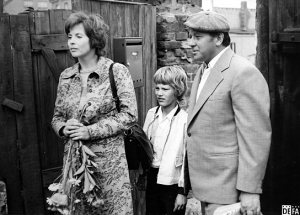Biography
Ursula Karusseit was born August 2, 1939, in Elbing near Danzig in West Prussia but moved with her family via Mecklenburg to Gera during her youth. After finishing school she attended a commercial apprenticeship and subsequently worked as a stenotypist and case handler.
Karusseit took to acting as a hobby that soon turned into a true passion. After her application to Leipzig"s drama school was rejected, she studied at Staatliche Schauspielschule Berlin-Schöneweide (today: Hochschule für Schauspielkunst "Ernst Busch") from 1960 on. There, her teachers included Wolfgang Heinz and Erika Pelikowsky.
After her graduation from drama school, she started a long-time engagement at Berlin's Volksbühne. Temporarily, she also made guest performances at other Berlin theatres like Maxim-Gorki-Theater, Deutsches Theater and Theater im Palast (TiP). Karusseit celebrated huge success on stage with her performances as Shen Te in Bertolt Brecht's "Der gute Mensch von Sezuan" ("The Good Person of Szechwan"), as Rote Rosa in "Moritz Tasso", and as Elsa in "Der Drache", among numerous other performances. "Moritz Tasso" and "Der Drache" were directed by Swiss director Benno Besson. Karusseit gave birth to their son Pierre Besson in 1967. In 1969, the couple married.
From 1987 onwards, Ursula Karusseit worked as a freelance actress and, for instance, performed at Schauspiel Köln, at Berlin's Schillertheater, as well as at Munich's Kammerspiele. Furthermore, she started to direct plays herself, for instance, in Dresden, Zittau, and in Tübingen.
Ursula Karusseit made her movie debut in 1963 in Lothar Bellaq's TV movie "Was ihr wollt". Five years later, she became known to a large audience as maid Gertrud Habersaat in Helmut Sakowski’s five-part TV series "Wege übers Land" that retold the story of the village of Rakowen and of several of its residents between 1939 and 1953.
Karusseit continued to mainly work for TV productions. She, for instance, starred alongside Hilmar Thate in the five-part TV movie "Daniel Druskat" (1975) and alongside Wlater Plathe and Jürgen Heinrich in "Märkische Chronik" (1983). After the German reunification, she appeared in TV series like "Liebling Kreuzberg", "Praxis Bülowbogen", and – since 1998 – in the long-running ARD TV hospital series "In aller Freundschaft".
Karusseit has been rarely seen on the movie screen. Under director Horst E. Brandt, she starred in "KLK an PTX – Die rote Kapelle" ("KLK to PTZ – The Red Orchestra", 1971) and under director Konrad Wolf, she appeared in "Der nackte Mann auf dem Sportplatz" ("The Naked Men in the Stadium", 1973). Furthermore, Karusseit played a double role in the DEFA children’s film "Die vertauschte Königin" (1984). After the reunification, she was seen in Andreas Dresen’s film "Nachtgestalten" ("Night Shapes", 1999), as well as in Adolf Winkelmann’s film "Waschen, Schneiden, Legen" (1999), also starring Guildo Horn. She made her last appearance on the big screen in 2008 as the mother of protagonist Eva (Anna Loos) in the romantic comedy "Nur ein Sommer" ("Where the Grass is Greener").
Besides her acting career, Ursula Karusseit also worked as a radio play voice, toured all over Germany with her program "Jazz, Lyrik, Prosa", and was a lecturer at Hochschule für Film und Fernsehen "Konrad Wolf" in Potsdam-Babelsberg since 1973. She was married for a second time to lighting technician Johannes Wegner and lived in Senzig, south of Berlin.
Ursula Karusseit passed away in Berlin on February 1, 2019.
